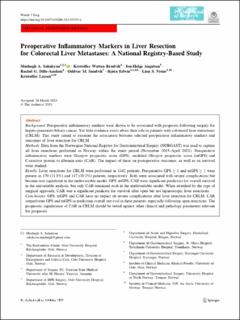| dc.contributor.author | Sahakyan, Mushegh | |
| dc.contributor.author | Brudvik, Kristoffer Watten | |
| dc.contributor.author | Angelsen, Jon-Helge | |
| dc.contributor.author | Dille-Amdam, Rachel G. | |
| dc.contributor.author | Sandvik, Oddvar Mathias | |
| dc.contributor.author | Edwin, Bjørn von Gohren | |
| dc.contributor.author | Nymo, Linn Såve | |
| dc.contributor.author | Lassen, Kristoffer | |
| dc.date.accessioned | 2023-10-25T10:47:08Z | |
| dc.date.available | 2023-10-25T10:47:08Z | |
| dc.date.created | 2023-06-07T18:56:08Z | |
| dc.date.issued | 2023 | |
| dc.identifier.citation | World Journal of Surgery. 2023, 47, 2213-2220. | en_US |
| dc.identifier.issn | 0364-2313 | |
| dc.identifier.uri | https://hdl.handle.net/11250/3098648 | |
| dc.description.abstract | Background Preoperative inflammatory markers were shown to be associated with prognosis following surgery for hepato-pancreato-biliary cancer. Yet little evidence exists about their role in patients with colorectal liver metastases (CRLM). This study aimed to examine the association between selected preoperative inflammatory markers and outcomes of liver resection for CRLM.
Methods Data from the Norwegian National Registry for Gastrointestinal Surgery (NORGAST) was used to capture all liver resections performed in Norway within the study period (November 2015–April 2021). Preoperative inflammatory markers were Glasgow prognostic score (GPS), modified Glasgow prognostic score (mGPS) and C-reactive protein to albumin ratio (CAR). The impact of these on postoperative outcomes, as well as on survival were studied.
Results Liver resections for CRLM were performed in 1442 patients. Preoperative GPS C 1 and mGPS C 1 were present in 170 (11.8%) and 147 (10.2%) patients, respectively. Both were associated with severe complications but became non-significant in the multivariable model. GPS, mGPS, CAR were significant predictors for overall survival in the univariable analysis, but only CAR remained such in the multivariable model. When stratified by the type of surgical approach, CAR was a significant predictor for survival after open but not laparoscopic liver resections.
Conclusions GPS, mGPS and CAR have no impact on severe complications after liver resection for CRLM. CAR outperforms GPS and mGPS in predicting overall survival in these patients, especially following open resections. The prognostic significance of CAR in CRLM should be tested against other clinical and pathology parameters relevant for prognosis. | en_US |
| dc.language.iso | eng | en_US |
| dc.publisher | Springer | en_US |
| dc.rights | Navngivelse 4.0 Internasjonal | * |
| dc.rights.uri | http://creativecommons.org/licenses/by/4.0/deed.no | * |
| dc.title | Preoperative Inflammatory Markers in Liver Resection for Colorectal Liver Metastases: A National Registry-Based Study | en_US |
| dc.title.alternative | Preoperative Inflammatory Markers in Liver Resection for Colorectal Liver Metastases: A National Registry-Based Study | en_US |
| dc.type | Peer reviewed | en_US |
| dc.type | Journal article | en_US |
| dc.description.version | publishedVersion | en_US |
| dc.source.pagenumber | 0 | en_US |
| dc.source.journal | World Journal of Surgery | en_US |
| dc.identifier.doi | 10.1007/s00268-023-07035-z | |
| dc.identifier.cristin | 2152865 | |
| cristin.ispublished | true | |
| cristin.fulltext | original | |
| cristin.qualitycode | 1 | |

